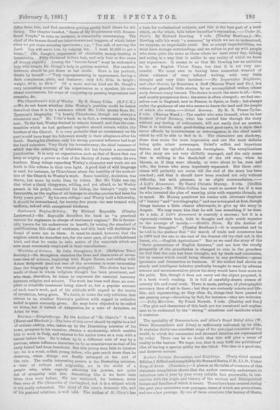The Churchman's Life of 'Wesley. By R. Denny Urlin. (S.P.C.K.)
e--We do not know whether John Wesley's position could be bettor described than it is by a sentence which Me. Urlin quotes from Mr. Tyerman's biography, "a hearty Churchman, though not always a consistent ono." Mr. Urlin's book is, in fact, a commentary on this text. To the last, Wesley desired to remain himself, and that the com- munities which ho had gathered together should remain within the borders of the Church. It is very probable that no consistency on his part:would have kept his followers steady in their allegiance after his death. During his lifetime, only his strong personal influence had kept the bond unbroken. Very likely his inconsistency, the chief instance of which was the ordaining of ministers, did but furnish a convenient justification. It is only an organisation such as that of Rome that can keep so mighty a power as that of the Society of Jesus within its own borders. Many things regarding Wesley's character and work are set forth in this volume in their true light. A good deal of wild language is used, for instance, by Churchmen about the hostility of the authori- ties of the Church to Wesley's work. Some hostility, doubtless, was shown, but more by mobs than by rulers. But Mr. Urlin can say that when a timid clergyman, willing, and yet afraid, to let Wesley preach in his pulpit, consulted his bishop, the bishop's "reply was bens-arable, es the replies of all bishops to similar queries had been for forty years past." By his own college—and Wesley held a fellowship, it should bo remembered, for twenty-five years—ho was treated with Uniform, indeed with exceptional kindness.


































 Previous page
Previous page